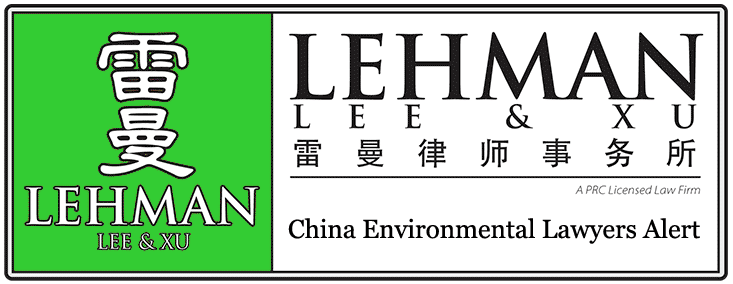

 |
|
LEHMAN, LEE & XU China Lawyers |
|
China Environmental Lawyers Alert |
|
July 2014
|
The China Law News keeps you on top of business, economic and political events in the China. |
|
|
|
In the News |
China to play its part in green campaign |
Pressures on the planet call for a sound system of international environmental governance Human society is challenged by overpopulation, unbalanced development, the depletion of resources and environmental degradation, even as the creation of unprecedented material wealth, begun in the Industrial Revolution, continues. In that light, humanity has been looking for global solutions to environmental and development issues in forums such as the United Nations Conference on the Human Environment in Stockholm, the Rio+20 Summit and in documents such as the Declaration on the Human Environment and The Future We Want. China, the largest developing country, has also experienced unprecedented environmental challenges as it has undergone rapid economic expansion. Environmental issues that arose in developed countries in the throes of industrialization over 100-200 years have arisen in China in just 30 years and are extremely complex. Indeed, even as old environmental problems have remained unresolved, new ones have arisen. Generally, China faces more complex and difficult environmental problems than do other countries. As a responsible country, it has always followed a strategy of sustainable development. It has tried to integrate ecological, economic, political, social and cultural issues as it pursues growth, the ultimate goal being a country that can be called beautiful in all possible aspects. In balancing the needs of economic growth and the environment, the government has adopted an approach that recognizes the importance of both, but with environmental issues being preeminent. The government also acknowledges the importance of localizing and increasing sustainable development. In the Government Work Report this year, Chinese Premier Li Keqiang said the government will fight pollution with the same kind of determination that it has mustered in fighting poverty. The newly revised Environmental Protection Law, adopted by the legislature in April, is a milestone. It draws on consensus in a field where disagreements can sometimes abound, promoting practical green development and giving all stakeholders a say. The law defines the concept of building a society that pays full heed to the environment, including sustainable development, and requires a system of environmental and public health monitoring and evaluation and public consultation. The Chinese government is now directing its attention to preventing and controlling air, water and soil pollution. It has formulated and implemented the Action Plan for the Prevention and Control of Air Pollution and is stepping up preparations for its Clean Water Action Plan and the Action Plan for the Prevention and Control of Soil Pollution, underlining its determination to control pollution, improve environmental quality and protect public health. Even though the world has exerted huge efforts to tackle environmental problems, the overall threat to humanity remains grave. The loss of biodiversity, climate change, the water crisis, chemical pollution and land degradation have not been effectively resolved. In most developing countries, the deterioration of environmental quality is exacerbated by the growing population, industrialization and urbanization, as well as the transfer of pollution from developed countries. This calls for a sound system of international environmental governance with concerted efforts from all countries. In this respect, the world needs to strengthen mutual trust and collaboration. The United Nations Environmental Programme should play a leadership role, such as improving instruction, coordination and implementation, strengthening decision-making in developing countries, removing barriers in capital, technical matters and capacity building in developing countries, and forging new partnerships with international organizations, governments and the public. It requires fair, just, open, and inclusive development. Countries should have the courage to take joint responsibility for protecting the Earth, but also face the reality of different countries and regions being at different stages of development, and comply with the Rio principles, in particular common but differentiated responsibilities. Developing countries should develop and implement sustainable development strategies based on national realties, while developed countries should fulfill their commitments by changing unsustainable patterns of production and consumption and helping developing countries build capacity to grow sustainably. Feasible goals are needed for sustainable development. In relation to the direction of the environment and development worldwide, these objectives should help developing countries achieve their goals taking into account local conditions and the difficulties they face, and drive the common progress of all countries. The UNEP should provide scientific support for environmental goals and act as a coordinator in the implementation to help developing countries build capacity and accomplish the goals. As the specific initiatives to implement results of the Rio +20 Summit, the UNEP and the UN Environment Assembly will draw up a new green plan for the world. China would like to strengthen cooperation with the UNEP, and to share opportunities and face challenges with countries on green development, environmental governance and environmental cooperation. http://africa.chinadaily.com.cn/weekly/2014-06/20/content_17603238.htm |
|
|
|
|
| Proud Member of |